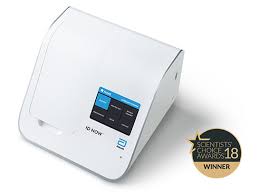Abbott, Author Interviews, Flu - Influenza / 08.10.2018
Abbott’s ID NOW Can Confirm Flu Infection in 13 Minutes or Less
MedicalResearch.com Interview with:
Dr. Norman Moore PhD
Abbott’s Director of Scientific Affairs for Infectious Diseases
MedicalResearch.com: What is the background for this test? How does ID NOW differ from other tests for influenza?
Response: This test was developed to give providers – and their patients – lab-accurate results more quickly than ever, right at the point of care. It was designed for ease of use, as well as to be portable and small enough that it can be used in a broad range of healthcare settings, including walk-in clinics, urgent care centers, doctors’ offices and emergency rooms.
Prior to ID NOW, traditional molecular tests offered great performance, but took too long to impact treatment decisions. ID NOW is able to deliver the performance and accuracy of lab-based tests in a timeframe that offers the best chance of improving treatment decisions. (more…)


